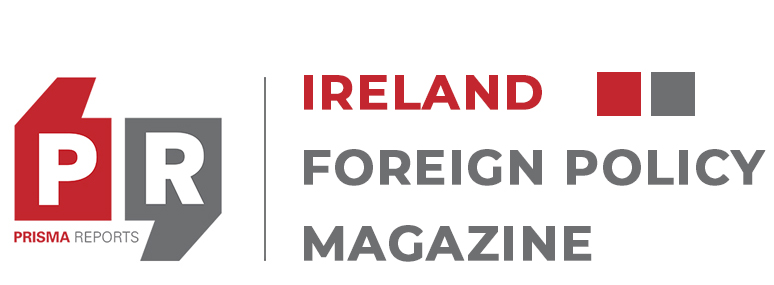
19 Sep Targeted investments see Ireland’s economy rise
Leo Clancy, CEO, Enterprise Ireland, showcases Ireland’s recent rise in export-driven businesses and the reasons for the nation’s growing gross domestic product
What does Enterprise Ireland provide for the country?
As a small island nation, our exporting sector is vital to Ireland’s economic success and job creation strategy. Enterprise Ireland provides capability building and financial supports to drive the scale of Irish companies across international markets. Particularly relevant elements are our network of 40 overseas offices and team of experienced market advisors who help client companies breach new markets and build relationships with global buyers. We are also focused on ensuring that there is a strong pipeline of high-potential start-ups in the country. We invest in the most innovative Irish companies through all stages of growth. We also drive collaboration and commercialization of state-funded research.
Since the mid-1990s the Irish government has committed more than $585 million in seed and venture capital schemes through Enterprise Ireland. The scheme is crucial in fostering strong growth of innovative indigenous companies in early and late scaling journeys.
In recent years we have seen many strong start-ups in fintech, cybersecurity, digital health and agritech sectors. We have also put a strong focus on women-led start-up companies. Our level of investments in women-led businesses is two to three times the global average.
Enterprise Ireland’s role has never been more important to the Irish state and our clients. We want to be the best agency in the world in supporting innovative, job-creating exporters through our excellent people and obsession with client success. The best is yet to come for Ireland’s industry. We can create more global-scale companies, diversify export markets and continue to grow the volume and quality of world-leading innovative and fast-growth companies.
Ireland is a small, open economy, but one with global reach and a key understanding of what it takes to succeed. Partnership and openness will be critical in the coming years. Irish companies are adaptable, highly innovative and business minded. Our companies succeed not because they are Irish but because they are excellent. All these attributes will be key to thriving in a global economy that is moving faster than it ever has before.
How did the COVID-19 pandemic affect Ireland’s overall economy?
COVID-19 created unprecedented challenges for everyone. From the outset, our approach was focused on helping companies stabilise, reset and recover. This included creating a dedicated COVID-19 response hub that provided crucial advice to over 8,000 companies; a scheme targeted at sustaining 27,500 jobs across Irish enterprises; and grants to hundreds of retailers to quickly pivot their online offerings. The move to digital is a crucial first step for many companies to move into foreign export markets and build a stronger base. Additionally, we provided direct support for companies who required financial or business continuity planning during the pandemic.
Despite challenges, Ireland was the only economy in the EU to grow in 2020, with a growth of 3%. We also maintained employment levels in Enterprise Ireland’s client companies. Exports by Irish companies were up marginally year-on-year despite declines in most advanced economies.
While it has been a very difficult year for many companies, exporting Irish businesses responded to the pandemic by pivoting to meet new demand in response to emerging market needs in areas such as life sciences, digital health and consumer retail. Ireland is now ranked fifth in the world for global exports of COVID-19 related goods and services according to the Organisation for Economic Co-operation and Development.
COVID-19 will have a lasting impact on the digitalization of companies following an accelerated shift in consumer behaviour and ways of working. This will make a significant difference in the medium term, particularly in enabling formerly locally focused Irish companies to access global markets. However, we do see significant inflation in logistics and material costs that is being felt all over the world. This will cause companies to look more closely at their long-term supply chain resilience and costs.
What Irish companies were the biggest heroes during the crisis?
ICON is a global provider of outsourced drug and device development and commercialisation services to the pharmaceutical, biotechnology and medical device industries and government and public health organizations. ICON provided clinical trial services to the Pfizer and BioNTech investigational COVID-19 vaccine program. The company mobilized a large global team of therapeutic and operational specialists to partner on the implementation of Pfizer‘s and BioNTech’s strategic plan and framework for the monitoring of the trial. This included a high level of remote clinical monitoring, source data verification, on-site monitoring and safeguarding data quality and integrity in the evolving pandemic environment. The team increased its efficiency to ensure a rapid study.
Global software developer and consultancy firm Nearform built the world’s most widely adopted COVID-19 contact tracing app, now used by millions across Europe and the U.S., including in the states of New York, New Jersey, Pennsylvania and Delaware. The app offers exposure notification, symptom tracking, language localization and additional customizable features. It works across borders to allow users to travel with the same level of protection and privacy. NearForm develops enterprise software for large corporate and public sector companies to scale their platforms for the digital economy. It recently announced plans to expand across North America to meet demand.
Additionally, Irish biometric authentication solutions provider Daon created VeriFLY, a mobile health passport. American Airlines is the first U.S. airline to adopt the VeriFLY technology. It provides customers with an easy method of providing results from a negative coronavirus test and other completed documents required for international travel into the United States. British Airways also announced they will use the app.
How will the new upswing in digital technologies affect Ireland’s various sectors?
It is difficult to pick a sector that will be most changed. However, they include agrifood, engineering, consumer products and construction sectors. Even the most traditional industries are seeing rapid adoption of digital technologies; no industry will be left unchanged. Irish companies are responding strongly to this. We recently saw an expansion announcement from Herdwatch, an Irish company that supplies farmers with an app to manage all aspects of their herds.
As we emerge from COVID-19, a key priority for Enterprise Ireland in 2021 and beyond is the transformational change within our client base. We want to help more small and medium-sized enterprises adapt their business models and invest in research and development, increase adoption of digital technologies and respond to climate change and carbon reduction opportunities for future business growth. Driving capability in the fields of digitalization, research and innovation and maximizing collaboration nationally and regionally, including the funding of disruptive technologies, technology centers and regional technology clusters, are all key focus areas.
What are the public and private sectors doing to promote environmental sustainability in Ireland?
The Irish government has recently launched legislation that commits Ireland to halving our greenhouse gases by 2030 and reaching net zero by 2050. This presents significant challenges for all industries, but also opportunities for Irish businesses in a wide range of areas such as offshore wind and cleantech sectors. Substantial changes are required to meet national and EU emissions targets, increase regulation and change consumer and buyer preferences. Increasing customer demand for sustainable and innovative products and services will provide more opportunities for Irish businesses.
Our job is to support the industry in responding to associated challenges. Enterprise Ireland launched a new Climate Enterprise Action Fund in 2021 to help a wide range of businesses to take their first step or accelerate existing plans to compete and grow in Ireland’s low-carbon future.
There are many examples of companies already taking advantage of the shift. In the agritech sector, which is a strong sector in Ireland, Keenan’s advanced diet feeders promote sustainability in farming by reducing waste, maximizing animal feed efficiency and enabling a circular economy. In the same sector, Devenish Nutrition recently launched their Agrinewal platform to measure and manage carbon emissions on farms. In other sectors, CitySwift has created a platform that uses data to strategically improve public transit, making the most sustainable modes of transport more efficient and user friendly. Ecocem is improving and promoting the use of a greener cement alternative. Additionally, Ocean Energy is capturing and converting the power of waves into electricity using their unique technology.
What impact has Brexit had on Irish business sectors?
The most affected sectors are companies exporting or importing to and from the UK. The UK remains our largest export market at $8.8 billion. We have worked closely with companies to help them prepare. It is early to say what sectors will be most affected in the long-term by Brexit. It will depend on final implementation of the EU-UK Trade and Cooperation Agreement and the normalisation of some of the distortive effects of supply chain adjustments during this initial period. However, the area of most concern would be the agrifood sector.
Since the Brexit vote, Enterprise Ireland’s priority has been to ensure that Irish exporters were prepared. We implemented a program to support Irish exporters in being more innovative, competitive and diversified, including $146 million in funding to Brexit exposed clients in 2018 and 2019. We also introduced programs to help companies hire customs experts.
We are still working to assist companies to avail of continuing opportunities in the UK. We opened an Enterprise Ireland office in Manchester. Our second UK office underlines our ongoing commitment to supporting our clients in the UK and signals our confidence in the market.
How significant is the U.S. market to Irish industry?
The U.S. is a very important trading partner with Ireland. U.S. multinationals have significant operations in Ireland across information technology, pharmaceuticals and medical devices sectors. What is often missed is that the relationship is a two-way street.
Underscoring the robust and diverse economic relationship between the Irish and American economies, a new Bureau of Economic Analysis report from the U.S. Department of Commerce placed Ireland ninth in foreign direct investment contributions to the United States’ economy. Irish investment in the United States is now at $240.1 billion, up 0.4% from the 2020 report. More than 110,000 people are now employed by Irish-owned companies in the United States. Over the last two years, Irish companies established an additional 125 new presences in the U.S. market. This signals confidence in a continued positive trading relationship with the country.
We keep a watching brief on the international trading landscape and how changes might impact the internationalization and market diversification of Irish companies. Any move towards trade protectionism is always of concern, particularly to a small island nation that depends on export markets. However, Ireland has always been flexible and adaptable. Our companies work hard to add economic benefits in the locations they invest in. This is building a strong future relationship with the USA.

No Comments